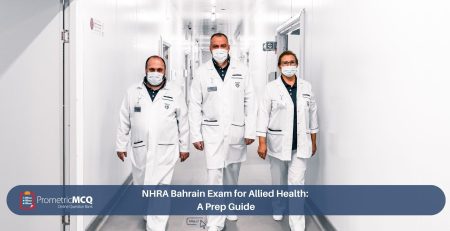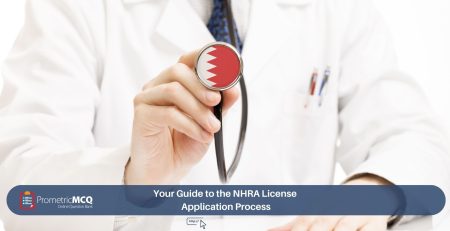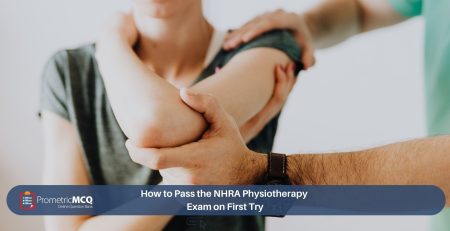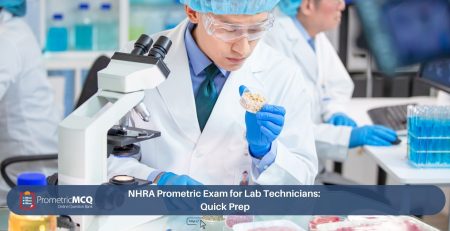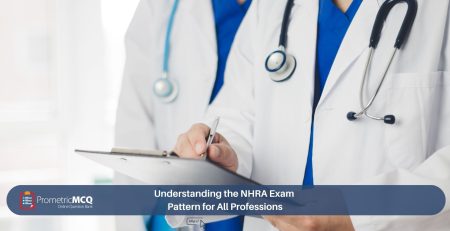
NHRA Bahrain Exam for Nurses: Top Questions for 2025
fatima@prometricmcq.com2025-09-17T21:43:15+00:00Table of Contents
ToggleNHRA Bahrain Exam for Nurses: Top Questions for 2025
The Kingdom of Bahrain, with its rapidly growing healthcare sector and commitment to international standards of excellence, presents a wealth of opportunities for skilled nursing professionals. To ensure the highest quality of patient care, the National Health Regulatory Authority (NHRA) mandates that all nurses pass a comprehensive licensing examination. This exam is the crucial gateway for any nurse seeking to practice in Bahrain’s dynamic and modern healthcare environment.
The NHRA Nursing Exam is not a simple test of textbook knowledge. It is a sophisticated, scenario-based assessment that evaluates your clinical judgment, your ability to prioritize tasks under pressure, and your unwavering commitment to patient safety. Success on this exam is a testament to your competence as a professional nurse. Achieving a passing score requires a strategic, focused, and practice-intensive preparation approach, moving beyond rote memorization to a deep understanding of core nursing principles.
This ultimate 2025 guide is your definitive roadmap to conquering the NHRA Nursing Exam. We will provide a deep dive into the exam’s structure, a thorough review of the most frequently tested topics, and a collection of high-quality sample Multiple-Choice Questions (MCQs) with detailed, expert-written rationales. This guide is more than just a list of questions; it is a complete preparation system designed to build your confidence and ensure you pass on your first attempt.
Key Takeaways for NHRA Exam Success
- Prioritization is Paramount: A huge portion of the exam will test your ability to identify the most critical patient. Master the ABCs (Airway, Breathing, Circulation) and Maslow’s Hierarchy of Needs.
- Patient Safety is the Golden Thread: From medication administration rights to infection control and fall prevention, every question has a safety component. Always choose the safest option.
- Flawless Calculations Required: Expect medication dosage calculation questions. They are considered “critical” items, and you must answer them correctly. Practice until they are second nature.
- Fundamentals are the Foundation: A strong understanding of the nursing process (ADPIE), therapeutic communication, and ethical/legal principles is essential.
- Practice is Everything: The most effective way to prepare is with a high-quality QBank. For a focused approach, start with our resources for Bahrain NHRA Exam Preparation.
Deconstructing the NHRA Nursing Exam Blueprint for 2025
A strategic approach begins with knowing the exam’s landscape. The NHRA exam for Registered Nurses is a Computer-Based Test (CBT) typically consisting of 100 MCQs to be completed in 2.5 hours (150 minutes). The content is designed to reflect the core competencies required for safe and effective nursing practice in Bahrain.
| Core Nursing Domain | High-Yield Topics and Concepts for 2025 |
|---|---|
| Fundamentals of Nursing | Nursing Process (ADPIE), Vital Signs interpretation, Fluid & Electrolyte balance/imbalance, IV Therapy (complications like infiltration, phlebitis), Asepsis, Wound Care, Mobility, and Ethical/Legal principles (consent, confidentiality, negligence). |
| Medical-Surgical Nursing | This is the largest domain. Management of patients with Cardiovascular (MI, Heart Failure), Respiratory (Asthma, COPD, Pneumonia), Endocrine (Diabetes, DKA, Thyroid disorders), Neurological (Stroke, Seizures), and GI/Renal disorders. Pre-operative and post-operative care are heavily tested. |
| Pharmacology & Medication Administration | The “10 Rights” of medication administration, Dosage Calculations (oral, IV, drip rates), major drug classifications (antihypertensives, anticoagulants, antibiotics, diuretics), and recognizing/managing adverse effects and allergic reactions. |
| Patient Safety & Infection Control | Standard, Contact, Droplet, and Airborne precautions. Donning and Doffing of PPE. Fall prevention strategies, safe patient handling, medication error prevention, and recognizing early signs of sepsis or anaphylaxis. |
| Maternal & Child Health (Maternity & Pediatrics) | Antepartum, intrapartum, and postpartum care (recognizing complications like hemorrhage or pre-eclampsia). Newborn assessment (Apgar score). Pediatric growth and development milestones, pediatric medication calculations, and management of common childhood illnesses like dehydration. |
| Leadership, Management & Delegation | Prioritization of care for a group of patients, appropriate delegation of tasks to unlicensed assistive personnel (UAP) or practical nurses, inter-professional communication (SBAR), and conflict resolution. |
Top NHRA Nursing Exam MCQs with In-Depth Answers
The following questions are crafted to simulate the real exam. Use them to test your clinical reasoning and deepen your understanding by carefully analyzing the rationales. For comprehensive practice, a dedicated Nursing MCQs bank is your most valuable asset.
MCQ 1: Prioritization of Care
A nurse on a busy medical unit has just received the morning report. Which of the following patients should the nurse assess first?
- A patient with type 2 diabetes requesting their morning insulin.
- A patient with pneumonia who has a temperature of 38.5°C and a productive cough.
- A patient scheduled for discharge who needs education on their new anticoagulant medication.
- A patient with a history of asthma who is reporting shortness of breath and has an oxygen saturation of 89% on room air.
Correct Answer: D
Rationale: This question requires you to use the ABC (Airway, Breathing, Circulation) framework for prioritization. The patient with asthma reporting shortness of breath and demonstrating hypoxia (SpO2 of 89%) has an acute breathing problem. This is a life-threatening situation that requires immediate assessment and intervention to prevent further respiratory compromise. This patient is the most unstable and is the highest priority.
Why other options are incorrect:
A: Administering routine medication is important but not an immediate priority over a patient in respiratory distress.
B: A fever and productive cough are expected findings for a patient with pneumonia. While this patient needs assessment, they are not as unstable as the hypoxic patient.
C: Discharge education is a necessary task but can be planned for later in the shift. It is not an immediate life-threatening priority.
MCQ 2: Pharmacology Calculation
The physician has ordered an intravenous infusion of Heparin at 1,200 units/hour. The pharmacy supplies a bag containing 25,000 units of Heparin in 500 mL of 0.9% Normal Saline. The nurse should set the infusion pump to deliver how many mL/hour?
- 18 mL/hr
- 24 mL/hr
- 30 mL/hr
- 36 mL/hr
Correct Answer: B
Rationale: This is a standard rate calculation problem.
Step 1: Find the concentration of the solution. Concentration = Total Units / Total Volume = 25,000 units / 500 mL = 50 units/mL.
Step 2: Calculate the required rate in mL/hr. Rate (mL/hr) = Desired Dose (units/hr) / Concentration (units/mL).
Rate = 1,200 units/hr / 50 units/mL = 24 mL/hr.
Frequently Asked Questions (FAQs) for the NHRA Nursing Exam
The NHRA does not publish an official passing percentage. The exam is graded as Pass/Fail. However, the widely accepted standard for most Gulf region Prometric exams is around 60-65%. To be safe, you should aim to consistently score above 70% in your practice mock exams.
The process starts with creating an account on the NHRA’s online portal. You will need to submit your documents for credentialing and Primary Source Verification (PSV) via the DataFlow Group. Once your credentials are confirmed, the NHRA will issue an eligibility letter, which you will use to schedule your exam date through the Prometric website.
While all these exams test core nursing competencies based on international standards, there can be subtle differences. The NHRA exam is known for being very clinically focused and practical. Some candidates report slightly more questions on fundamentals and patient safety compared to others. However, the core content (Med-Surg, Pharm, etc.) is largely the same. You can learn more by reading our guide to the DHA, MOH, and HAAD exams for comparison.
No, there is no penalty or negative marking for wrong answers. It is crucial to answer every single question. If you are unsure, use the process of elimination to make your best educated guess.
Passing the exam makes you eligible for licensure. Your pass result is typically valid for one year. During this time, you must secure a job with a healthcare facility in Bahrain. Your employer will then complete the final steps of the licensing process with the NHRA on your behalf.
You must know the normal ranges for a Complete Blood Count (Hemoglobin, Hematocrit, WBC, Platelets), key electrolytes (Sodium, Potassium, Calcium, Magnesium), renal function tests (BUN, Creatinine), and key cardiac enzymes (Troponin). Many questions will require you to identify an abnormal lab value to answer correctly.
The standards and position statements from the International Council of Nurses (ICN) are globally respected and reflect the high level of professional practice expected by the NHRA. Familiarizing yourself with their Code of Ethics for Nurses is highly beneficial.
Candidates are typically allowed a total of three attempts to pass the NHRA exam. There is usually a waiting period required between attempts. If you fail a third time, you may be required to undergo further clinical training before being granted eligibility for another attempt. Always confirm the latest policy directly with the NHRA.
While Medical-Surgical nursing is the largest component, you must be well-prepared for both pediatrics and maternity. Expect questions on normal growth and development, pediatric dosage calculations, Apgar scoring, and common complications of pregnancy and childbirth. These sections are a crucial part of a general nurse’s scope of practice.
Without a doubt, a high-quality, comprehensive question bank (QBank) is the most effective tool. The ability to practice hundreds of exam-style MCQs, read detailed rationales, and take simulated mock exams is the key to building the knowledge and confidence needed to pass. You can find a dedicated resource at Bahrain NHRA Exam Preparation.
Conclusion: Your Gateway to a Nursing Career in Bahrain
The NHRA nursing exam is a challenging but surmountable milestone on your path to a rewarding career in Bahrain. Success is not a matter of luck but the result of a deliberate and strategic preparation plan. By focusing on the core principles of patient safety and prioritization, mastering fundamental nursing knowledge, and dedicating yourself to consistent MCQ practice, you will be fully equipped to demonstrate your competence and earn your license. This exam is your opportunity to prove your skills and join the ranks of respected healthcare professionals contributing to the well-being of the Kingdom of Bahrain.
Ready to Secure Your Future in Bahrain?
Our premium NHRA Nursing QBank provides thousands of high-yield MCQs, detailed rationales, and full-length mock exams that mirror the real test, giving you the confidence to pass on your first attempt.


